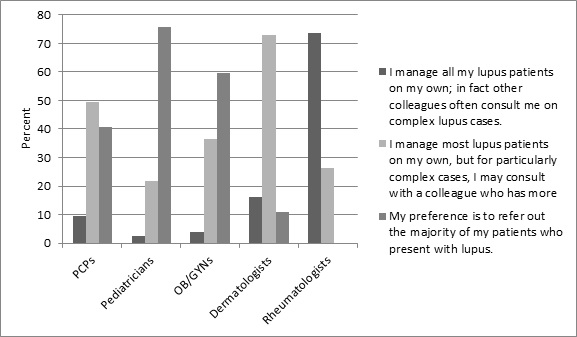Session Information
Date: Tuesday, October 23, 2018
Title: Systemic Lupus Erythematosus – Clinical Poster III: Treatment
Session Type: ACR Poster Session C
Session Time: 9:00AM-11:00AM
Background/Purpose:
Due to the systemic nature of lupus, individuals may interact with a diverse health care team when experiencing lupus symptoms and before receiving a diagnosis. This study describes the management practices of various physicians who may care for patients presenting with lupus with a focus on primary care physicians (PCPs) to highlight areas of opportunity to reduce time to diagnosis and care.
Methods:
An online survey was administered to 910 physicians in September 2016 using a provider list from the Lupus Foundation of America and a commercial web panel of physicians. Data collection included physicians’ perceptions, attitudes and reported behaviors related to the path to diagnosis and treatment of people with lupus. Descriptive analyses were conducted using chi-square and Kruskal Wallis tests for post-hoc comparisons.
Results:
Respondent characteristics are described in Figure 1. Figure 2 summarizes referral and management practices among different provider types, notably with higher proportions of dermatologists and PCPs often diagnosing or treating lupus patients. Rheumatologists were excluded from analyses as they are the primary healthcare providers for people with lupus. All provider groups differed significantly from one another in management practice, with PCPs being more likely than pediatricians and OB/GYNs to manage lupus patients on their own before referring patients out. Providers classified as having minimal or no experience with lupus were also asked to identify earliest actions they would take during an appointment if a patient presented with lupus symptoms. 86.2% of PCPs with minimal experience (n=119) would order bloodwork as their first action, which was a higher percentage than all other provider types. Only 13.8% of these PCPs reported that referring to a specialist would be their first action, ranking last after ordering bloodwork, asking a patient to track symptoms and following up, or directly treating the symptoms.
Conclusion:
PCPs frequently care for patients presenting with lupus who may or may not yet be diagnosed. These analyses highlight the tendency of PCPs to delay referrals when caring for these patients. Further studies should be conducted to examine whether this management preference exists among larger groups of PCPs and explore potential barriers for referring to specialists.
Disclosure:
The Lupus Foundation of America received funding from UCB Pharma to support study data collection.
|
Respondent characteristics (n=910)
|
||
|
Characteristic |
n (%)
|
|
|
Provider type |
PCP |
350 (38.5) |
|
Pediatrician |
130 (14.3) |
|
|
OB/GYN |
130 (14.3) |
|
|
Rheumatologist |
170 (18.7) |
|
|
Dermatologist |
130 (14.3) |
|
|
Practice setting |
Independent/private |
511 (56.2) |
|
Public health clinic (non-academic) |
61 (6.7) |
|
|
Part of a network of physicians at a hospital, health system, or university |
298 (32.7) |
|
|
Other |
40 (4.4) |
|
|
Medicaid/Medicare |
Accept Medicare |
221 (24.3) |
|
acceptance |
Accept Medicaid |
92 (10.1) |
|
Accept both Medicare and Medicaid |
525 (57.7) |
|
|
Do not accept Medicare or Medicaid patients |
57 (6.3) |
|
|
Not sure |
15 (1.6) |
|
|
Geographic |
(Sub)urban |
821 (90.2) |
|
location |
Rural |
89 (9.8) |
Figure 1. Respondent Characteristics
Figure 2. Management practices of patients presenting with lupus among physician groups (n=910)
To cite this abstract in AMA style:
Tse K, Daly RP. Lupus Primary Care Management Practices [abstract]. Arthritis Rheumatol. 2018; 70 (suppl 9). https://acrabstracts.org/abstract/lupus-primary-care-management-practices/. Accessed .« Back to 2018 ACR/ARHP Annual Meeting
ACR Meeting Abstracts - https://acrabstracts.org/abstract/lupus-primary-care-management-practices/

